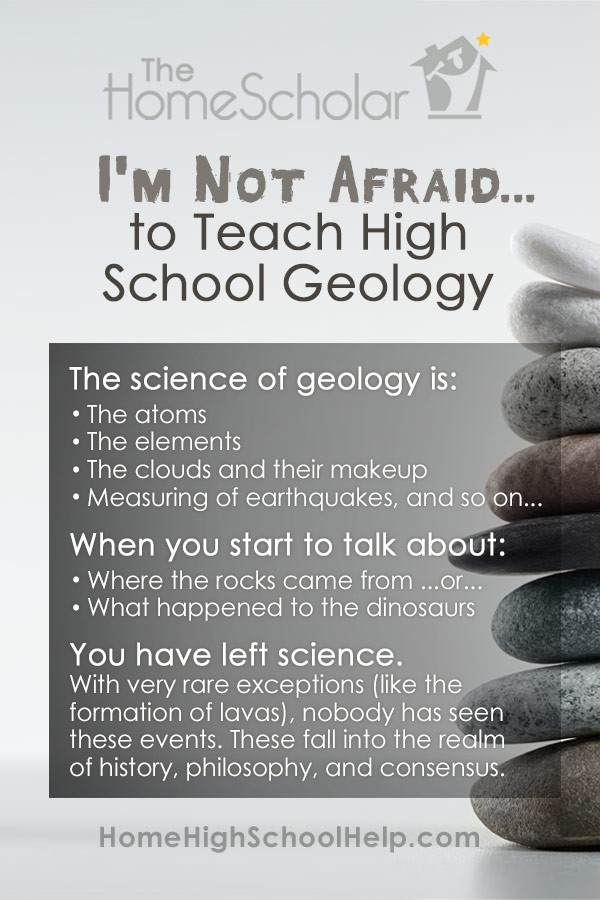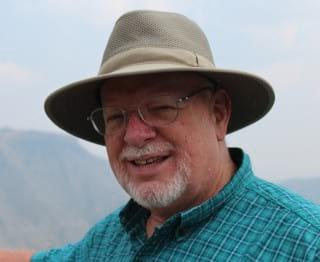I'm Not Afraid to Teach High School Geology!
High school geology and earth science: learn about the rock types, different layers of the atmosphere, throw in some volcanoes and earthquakes…I think we have it covered. And truth be told, you can cover much of this in the lower grades, even into middle school.
But there is one major component in studying geology that is left out of this list, that is too often not addressed in the study of geology. It helps to understand that much of the study you do in geology is based not on science, but on philosophy. That is, how our earth was created, how long it took, and when that happened. This is the component that we must talk about. Do I teach a creation-based science model, or an evolutionary model? Is it even possible to teach geology without having to choose a side?
The answer to that question is problematic. Yes, you should be able to teach geology purely from a scientific view. But the study of geology is usually tangled with a worldview that is presented as science, and not as the philosophy that it is. For instance, in most geology texts, when you study the makeup of the earth, you also study its age and how it was created. Neither of those things can be proven by science. But it is presented as science. Again, it is one thing to study different types of volcanoes, the makeup of lavas, the effect of volcanoes. It is another matter entirely to discuss the creation of earth where these volcanoes exist. One is a study in science, the other philosophy or history. If all you are studying is the facts, well then, yes, you can study geology without a worldview. But if you intend to discuss the origin of rocks, what created the Ice Age, or hope to understand how volcanoes fit into a very good creation, then you must choose a side. And high school is a great place to make sure that in studying geology that you delve into the importance of this difference.
As a Christian who believes what the Bible teaches about the origin of our earth, I believe it is vitally important to understand these differences. Geology is foundational to a proper understanding of biology, paleontology, astronomy, and so much more. If we expect our children to stand with a strong faith, they need an equally strong understanding of geology. And they need to know what is and is not science.
In order to understand the differences, I would suggest that you investigate these four words:
- Science
- History
- Philosophy
- Consensus
Science is what can be observed, tested and repeated.
History is a record of what has happened, written by eyewitnesses to that history, or complied by those who have investigated those accounts.
Philosophy is very simply what you believe, your worldview.
Consensus is when a group of people agree to something, regardless of the data.
Do you see where I am going? The science of geology is the atoms, the elements, the clouds and their makeup, measuring of earthquakes, and so on. But when you start to talk about where the rocks came from, or what happened to the dinosaurs, you have left science. With very rare exceptions (like the formation of lavas), nobody has seen these events. You are now in the realm of history, philosophy, and consensus.
The study of geology is different than the study of earth history. When it comes to earth history as it relates to geology, we have a few options about how to talk about what happened. First, there is a historical record that is found in the Bible. It explains how our world came to be.
But if we discard the historical narrative of the Bible, we need to find another approach. That is usually philosophy – what do you think happened, based on what you believe? We all know of people who say, "Well, I think this is how it happened…." This approach can sound scientific depending on how it is framed, but it is still philosophy, with no root in history.
Or, finally, you could fall back on consensus – the "Everybody thinks this is true," way of thinking. This is not how we want to teach our children to reason through thorny issues, especially one that has strong implications for our Christian faith.
And you really can't pretend like this issue is not real. This is your fair warning: if you choose to not delve into more than the bare scientific facts of geology, then you can be sure that somebody else will fill the vacuum you have left, by insisting that their philosophy is science.
So what is the answer? How do we train our kids in the area of geology? Is there a way to be solidly scientific and Biblical at the same time?
Yes, there is! And high school is a great time to help our kids learn to take what they have studied in the facts of geology, and then delve deeper into the "four words."
- Teach them the science of geology. Get the resources necessary to handle the actual science of this discipline.
- Teach them the difference between the "four words." Most textbooks they handle in geology needs to be met with healthy skepticism. Is what I am studying upheld by observation, testing and can it be repeated in an experiment? Is what I am reading somebody's interpretation, or is it upheld by science?
- Teach geology or some aspect of it each year, if you can. Be sure to always be examining what is science, and what is not.
As your child learns how to regularly ask questions about what can and can not be proven, they grow in not only their discernment, but in their faith. And this is the highest goal in the education of our children.
About the Author
Patrick Nurre, speaker and authro, was in the second grade when he made his first big find – a large dinosaur bone in the alley behind his house! That was the beginning of a love for geology. Raised in beautiful Montana, he spent many days rockhounding near the Big Horn River. This early interest led him to a lifelong study of the world of geology. Patrick was trained in secular geology, but after becoming a Christian, he began to seriously reevaluate his previous evolutionary beliefs, and became, instead, a young-earth creationist.
Today, Patrick conducts geology classes (PreK-12) and seminars in the Seattle area, and speaks at numerous home school and church conventions on geology and our young earth. He also leads a variety of geology field trips every year, including Yellowstone Park, where he helps families discover the Biblical geology of the Park. Patrick is the vision behind Northwest Treasures, a 501(c)3 corporation, devoted to creating excellent geology kits, curricula and education for all ages. To help in this endeavor, Patrick has written 17 books on geology, for all ages. He is is a long-standing participant in the IAC (International Association of Creation) Professional Development Program. In addition, he draws on over 40 years of pastoring experience. Patrick and his wife, Vicki, have three wonderful children and three grandchildren, and live in Bothell, Washington.
You can find Northwest Treasures on Facebook here and on Pinterest here. You can join the newsletter for Northwest Treasures here.

 Login
Login









.jpg)

Comments